How to Create an AI App: Steps, Technologies and Best Practices
Table Of Content
Published Date :
24 Sep 2025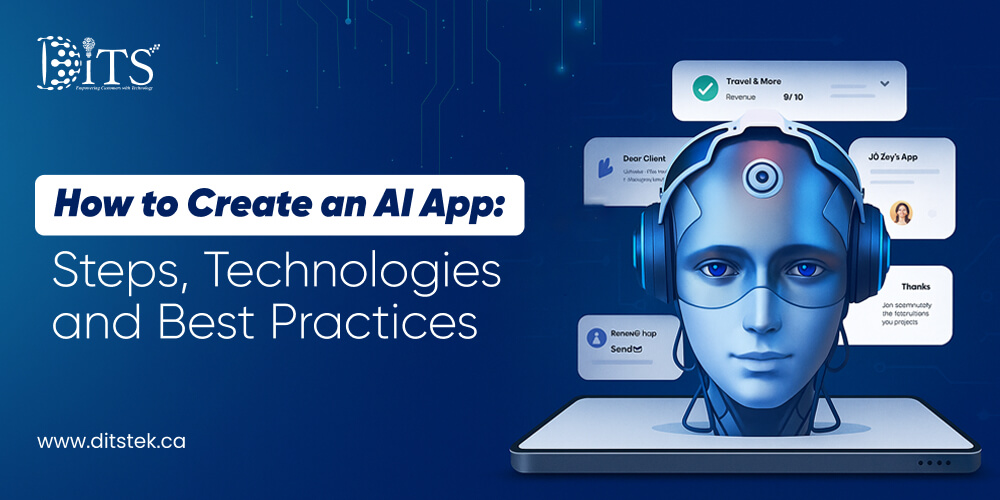
Artificial intelligence (AI) is quickly transforming the way businesses operate and offer services, especially the tech businesses. Whether it’s automating processes, improving decision-making, or delivering personalized customer experiences, AI-powered applications are reshaping how companies operate and compete.
Before developing an app, businesses need to plan how to create an AI app that can streamline their operations or give their customers something truly innovative. Many forward-thinking business owners are exploring this opportunity.
With the global AI market expected to grow by over 37% annually, the demand for intelligent, business-ready applications is only increasing. This blog shares the steps to create an AI app, tools, and best practices for mobile app development.
Why Businesses Are Investing in AI Apps
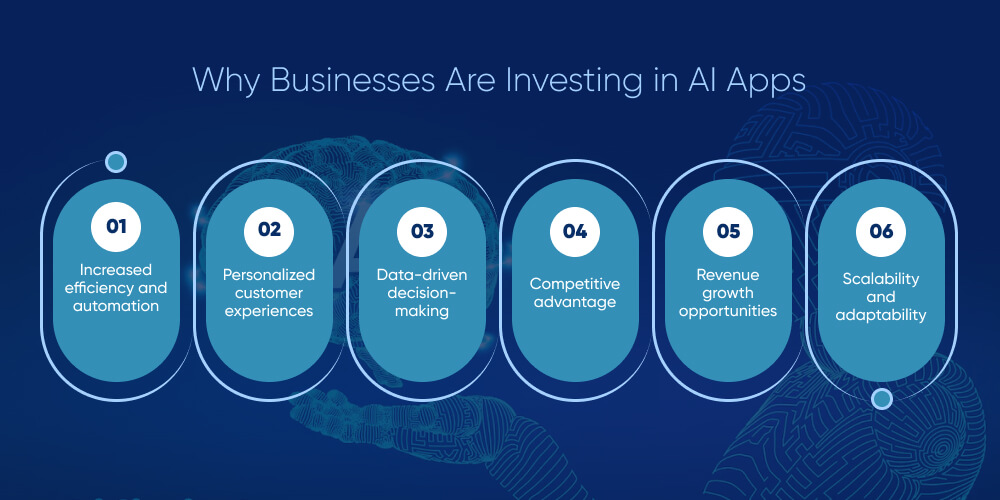
The surge in AI adoption is an innovative way to stay competitive, cut costs, and deliver more value to customers. From small startups to large enterprises, companies are realizing that AI-powered applications can do much more than just automate tasks. They can transform the way an organization operates, engages with customers, and makes decisions.
1. Increased efficiency and automation
AI apps can handle repetitive, time-consuming tasks such as data entry, report generation, and customer inquiries, freeing up employees to focus on strategic work. This leads to faster processes and fewer errors.
2. Personalized customer experiences
By analyzing customer data, AI apps can deliver product recommendations, personalized messages, and tailored services that improve engagement and loyalty.
3. Data-driven decision-making
AI-powered analytics help business leaders uncover trends, predict market changes, and make informed decisions backed by accurate insights.
4. Competitive advantage
Implementing AI before your competitors means you can capture market opportunities faster, offering more innovative, more adaptive services to your customers.
5. Revenue growth opportunities
AI can identify upselling and cross-selling opportunities, optimize pricing strategies, and streamline supply chains to boost profitability.
6. Scalability and adaptability
AI apps are designed to learn and improve over time, ensuring they continue to deliver value even as your business grows and customer demands evolve.
Ready to Build Your First AI App?
Discover expert guidance and proven strategies that leading businesses use to launch high-impact AI applications quickly and effectively.
How to Create an AI App for any Business
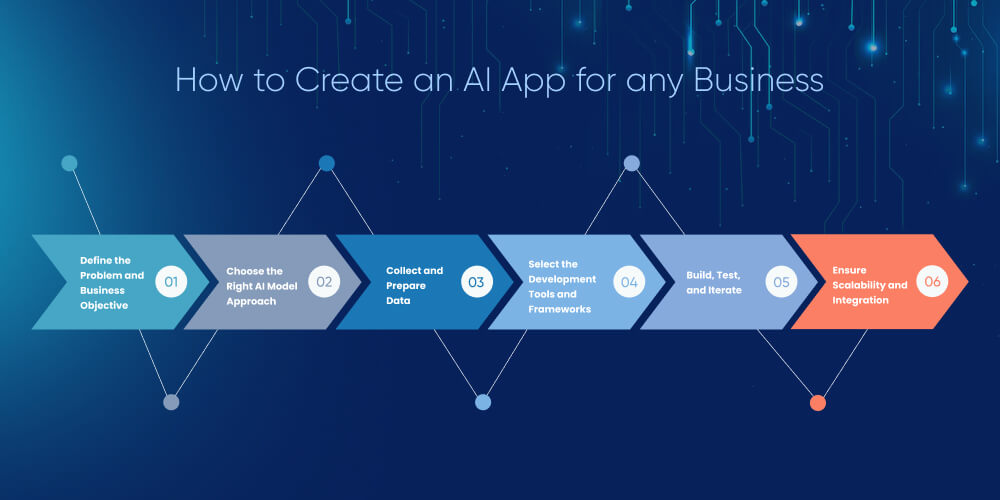
When business owners start exploring how to build an AI app, it’s essential to realize that the process involves more than just coding. Successful AI apps are built on well-defined goals, reliable data, and the right technological choices. Here’s a step-by-step look at how to approach the process strategically.
1. Define the Problem and Business Objective
Before writing a single line of code, identify the exact business challenge your AI app will address. This could involve improving customer support efficiency, predicting inventory shortages, or automating administrative workflows. A well-defined objective not only shapes the AI strategy but also helps measure success accurately, ensuring that any investment delivers measurable business outcomes.
2. Choose the Right AI Model Approach
Selecting the right AI approach, such as supervised learning, unsupervised learning, or reinforcement learning, can make or break your project. For instance, supervised learning is excellent for predicting customer churn, while unsupervised learning works well for market segmentation. Your business goals, available data, and desired outcomes should determine the model type to ensure accuracy and relevance.
3. Collect and Prepare Data
Data is the backbone of AI. Before development begins, gather all relevant datasets from internal systems, customer interactions, or third-party sources. Once collected, clean and label the data to remove duplicates, inconsistencies, or errors. High-quality, structured data improves the AI’s learning process, ensuring that your app delivers reliable predictions and insights that your team can trust.
4. Select the Development Tools and Frameworks
Choosing the right development environment is critical. Popular AI frameworks like TensorFlow, PyTorch, and Scikit-learn each have strengths depending on your needs. Evaluate factors such as scalability, cost, and compatibility with your tech stack. The right tools will streamline development. reduce errors, and allow for smooth integration with your current systems and future AI enhancements.
5. Build, Test, and Iterate
Instead of building a full-scale app right away, start with a Minimum Viable Product (MVP). This allows a business to test the core functionality and gather feedback from real users before making significant investments. Testing should be continuous; every improvement in AI model accuracy or UX design increases the app’s business value and long-term return on investment.
6. Ensure Scalability and Integration
Your AI app should be designed to grow with your business. This means it should handle larger datasets, more users, and additional features without performance issues. It should also integrate smoothly with the existing tools, whether it’s CRM systems, ERP platforms, or IoT devices, to ensure smooth operations and a unified flow of business information.
Essential Technologies for AI App Development
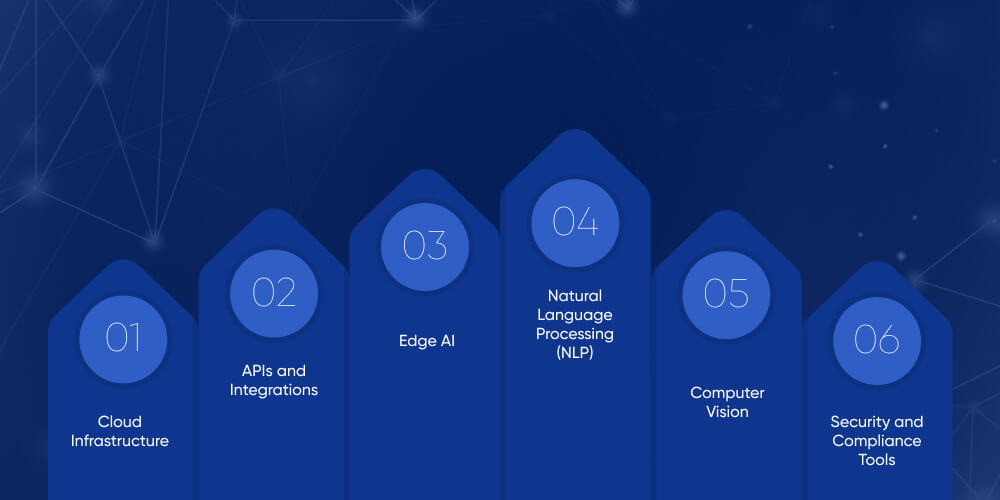
Building an AI app requires more than just coding skills; it demands the right technological foundation to ensure efficiency, scalability, and security. From cloud infrastructure to advanced analytics, these technologies form the backbone of modern AI solutions and help businesses achieve their goals faster and more effectively.
1. Cloud Infrastructure
Cloud platforms such as AWS, Google Cloud, and Microsoft Azure provide the computing power and storage needed to run complex AI models. Cloud-based AI enables your app to scale up or down based on demand, thereby lowering operational expenses while maintaining performance. For many businesses, this flexibility is crucial for handling seasonal or sudden spikes in usage.
2. APIs and Integrations
Application Programming Interfaces (APIs) make it easier to connect your AI app with other systems and services. Whether it’s payment gateways, CRM systems, or AI APIs like OpenAI or IBM Watson, integrations streamline workflows and reduce manual tasks. This ensures your app delivers value by working in harmony with existing business tools.
3. Edge AI
Edge AI brings computation closer to the data source, such as IoT devices, rather than relying entirely on cloud processing. This reduces latency, increases speed, and enables real-time decision-making, which is essential in industries like healthcare, manufacturing, and logistics. It’s especially effective when paired with IoT software development for on-device intelligence.
4. Natural Language Processing (NLP)
NLP enables AI apps to understand and respond to human language, powering chatbots, virtual assistants, and sentiment analysis tools. Businesses can use NLP for customer support automation, content categorization, or feedback analysis. With the proper NLP implementation, you can deliver more natural, human-like interactions, improving customer satisfaction and operational efficiency.
5. Computer Vision
Computer vision technology allows AI to interpret and process visual data from images and videos. This can be used for quality inspection, facial recognition, object detection, and even inventory tracking. By embedding computer vision into your AI app, you can enhance automation and accuracy in tasks that traditionally required human visual inspection.
6. Security and Compliance Tools
When building an AI app, security isn’t optional, but it's essential. Implementing encryption, secure authentication, and compliance with regulations such as GDPR or HIPAA protects user data and builds trust. Security tools also help prevent AI model exploitation, ensuring your application remains reliable and compliant across different regions and industries.
Want an App That Learns as You Grow?
Leverage AI-driven scalability and innovation designed to adapt seamlessly with evolving customer demands and future opportunities.
Best Practices for Building an AI App
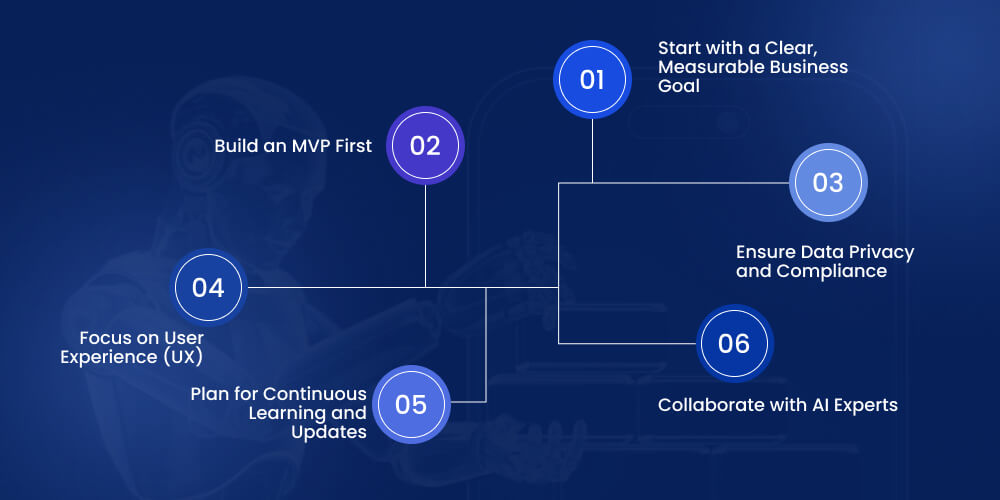
Even with the right tools and technologies, the success of your AI app depends on how it’s planned, developed, and maintained. Following proven best practices helps reduce risks, improve performance, and ensure your application delivers long-term value to your business.
1. Start with a Clear, Measurable Business Goal
Avoid building AI features just for the sake of having them. Identify specific objectives, such as reducing customer service wait times by 30% or improving product recommendation accuracy. Clear goals ensure your AI app remains focused, measurable, and aligned with your business strategy, increasing the likelihood of delivering real, sustainable results.
2. Build an MVP First
An MVP (Minimum Viable Product) lets you test core features before investing in full-scale development. This approach allows you to collect user feedback early, identify improvements, and avoid costly mistakes. It also accelerates your time to market, helping your business start benefiting from AI capabilities sooner rather than later.
3. Ensure Data Privacy and Compliance
Data protection is critical for building trust and meeting legal requirements. Whether your app handles customer records, healthcare information, or financial data, follow regulations like GDPR, HIPAA, or local privacy laws. Secure data handling is especially important for AI app development in Canada, where compliance requirements can vary by industry and region.
4. Focus on User Experience (UX)
A powerful AI app is only valuable if it’s easy and enjoyable to use. Prioritize intuitive interfaces, clear navigation, and responsive performance. Remember, AI should enhance the user experience, not overwhelm it. A strong UX helps increase adoption rates and ensures the AI app becomes a natural part of daily operations.
5. Plan for Continuous Learning and Updates
AI models need regular retraining to remain effective as market conditions, customer behavior, and available data change. Establish processes for ongoing monitoring, performance tracking, and feature updates. Continuous improvement ensures your app remains relevant, competitive, and capable of delivering fresh value to your users over the long term.
6. Collaborate with AI Experts
Partnering with experienced AI developers or a Custom Software Development Company in Canada can save time, reduce errors, and improve results. Experts bring technical knowledge, industry-specific insights, and proven methodologies to your project, helping you avoid common pitfalls and build an AI software that’s robust, scalable, and strategically aligned.
Common Mistakes to Avoid
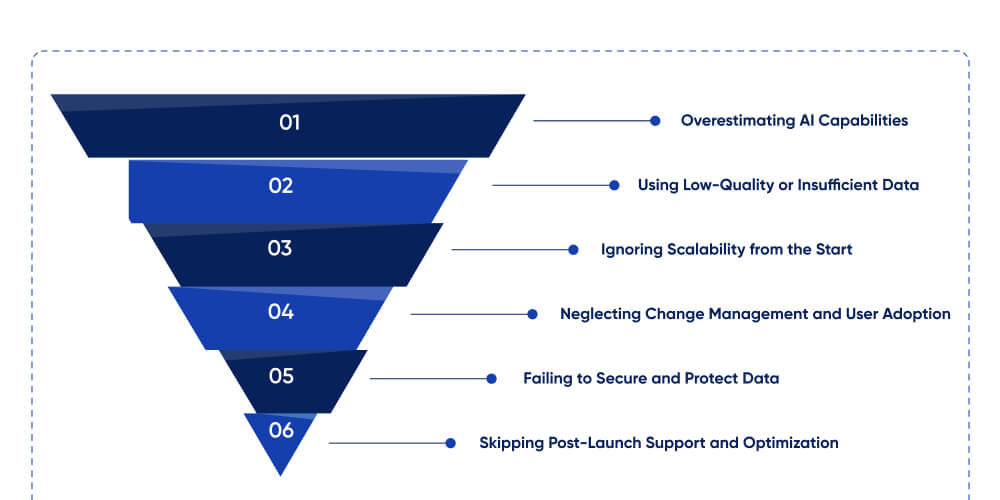
Even the most promising AI app ideas can fall short if certain pitfalls aren’t avoided. Understanding these common mistakes helps business owners plan more effectively, save resources, and build applications that truly deliver measurable results.
1. Overestimating AI Capabilities
AI is powerful, but it’s not magic. Expecting it to solve every business challenge without proper data, testing, and strategic alignment often leads to disappointment.
2. Using Low-Quality or Insufficient Data
Incomplete, outdated, or biased datasets can cripple your AI’s accuracy, making results unreliable.
3. Ignoring Scalability from the Start
Failing to plan for growth can result in costly rebuilds when demand increases.
4. Neglecting Change Management and User Adoption
Without proper training and communication, employees may resist using the app.
5. Failing to Secure and Protect Data
Security must be integrated from the planning stage, especially when using app development services.
6. Skipping Post-Launch Support and Optimization
Ongoing updates, retraining, and improvements are vital for long-term app success.
What’s Stopping You From Going AI-First?
Overcome barriers with strategic insights and tailored development support to bring your AI-powered vision into market faster.
Why Choose DITS for App Development Services
At DITS (Ditstek Innovations), we deliver more than just software development. We create intelligent, business-focused solutions that drive measurable results. Our expertise in app development services spans multiple industries, enabling us to design, build, and optimize applications that align perfectly with your operational goals.
We leverage AI throughout the development process, from software design and quality assurance to maintaining code quality and customizing features, ensuring every app we deliver is future-ready. Our team combines technical excellence with a deep understanding of business workflows, offering scalable and secure solutions that grow with your needs.
With 7 plus years of experience in mobile app development and a dedicated app development team, we can ensure that our solutions satisfy your business needs. Whether you’re launching a new product or modernizing existing systems, DITS provides the innovation, reliability, and strategic insight to transform your ideas into impactful, high-performing applications.
Conclusion
Creating an AI app is a practical step that many businesses are taking to improve efficiency, enhance customer experiences, and open new revenue streams. From defining a clear business goal to selecting the right technologies, every step plays a crucial role in the success of a project.
At DITS (Ditstek Innovations), we integrate AI into every software we develop; whether it’s for customization, maintaining code quality, or enhancing quality assurance. This approach ensures that our clients receive solutions that are not only intelligent but also scalable and future-ready. If you’re ready to explore AI-powered solutions tailored to your needs, our team can help turn your vision into a high-impact application.
FAQs
1. How long does it typically take to develop an AI app?
Timelines vary based on complexity, but most business-grade AI apps take between 3–6 months from concept to deployment, including testing and optimization.
2. What is the estimated budget range for an AI business app?
Costs depend on features, integrations, and data preparation needs. We provide a tailored estimate after evaluating your specific requirements.
3. What industries do you serve?
We have delivered solutions for healthcare, finance, logistics, retail, education, and manufacturing, adapting our AI strategies to meet industry-specific needs and compliance requirements.
4. Can you develop AI apps that integrate with IoT systems?
Yes. Our expertise includes AI solutions combined with IoT software development for industries such as logistics, healthcare, and manufacturing.
5. How do you ensure AI model accuracy?
We use high-quality data, continuous retraining, and AI-driven quality checks to ensure reliable and precise outputs.
6. Do you work with businesses outside Canada?
Absolutely. While we offer AI app development in Canada, our services extend globally, supporting clients in multiple industries and regions.
7. How do you ensure an AI app aligns with our business goals?
We begin with a thorough consultation to understand your processes, challenges, and objectives. This allows us to design an AI app that solves real business problems and delivers measurable ROI.
8. Can you integrate AI apps with our existing systems?
Yes. We specialize in seamless integration with CRMs, ERPs, IoT platforms, and other enterprise tools to ensure smooth operations without disrupting your existing workflows.
9. Do you provide ongoing support after deployment?
Absolutely. We offer maintenance, model retraining, and feature upgrades to keep your AI app competitive and high-performing long after launch.
10. Why choose you for App development services Canada?
Our Canadian market expertise, combined with global AI capabilities, ensures your application meets both local compliance standards and international performance expectations.

Dinesh Thakur
21+ years of IT software development experience in different domains like Business Automation, Healthcare, Retail, Workflow automation, Transportation and logistics, Compliance, Risk Mitigation, POS, etc. Hands-on experience in dealing with overseas clients and providing them with an apt solution to their business needs.
Recent Posts

Digital transformation in healthcare streamlines operations, reduces administrative waste, strengthens revenue cycles, and enables data-driven decisions that support sustainable cost control and improved care delivery.
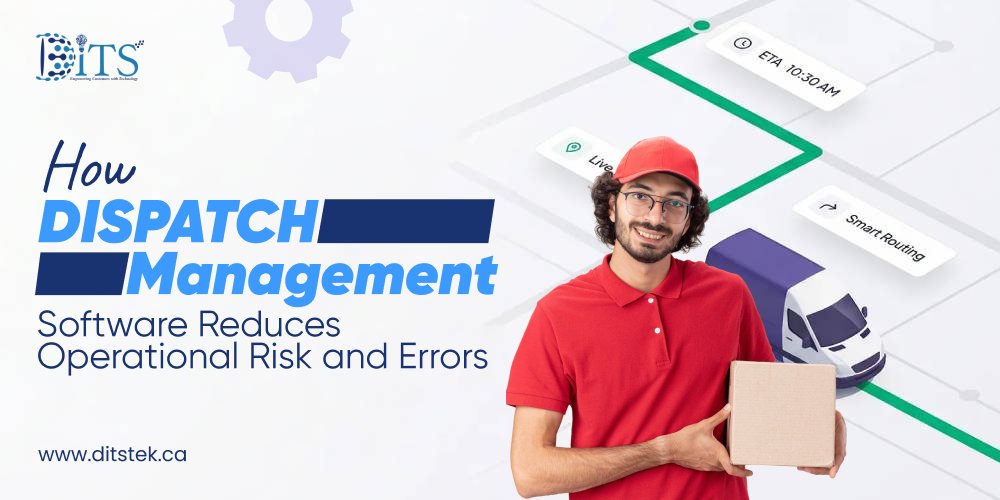
Reduce operational risks and errors by replacing manual, spreadsheet-based processes with dispatch management software.
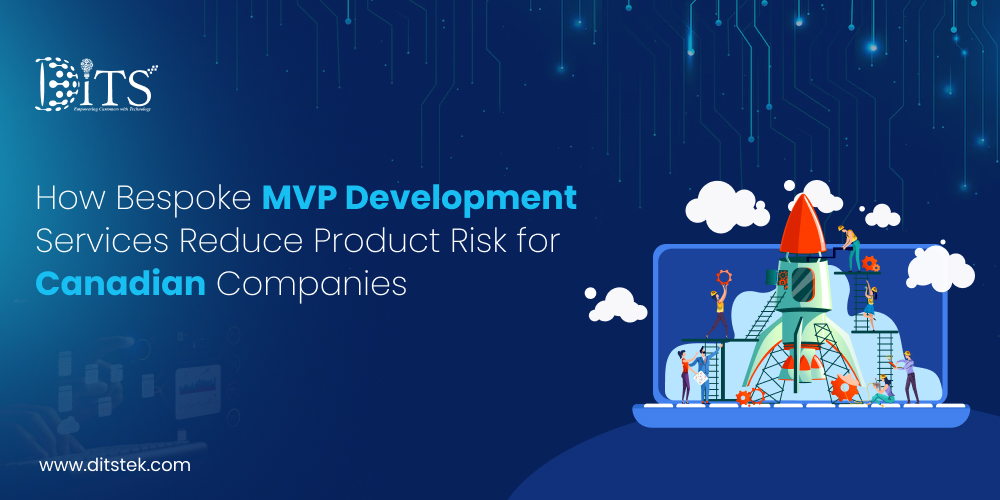
Discover how bespoke MVP development services help Canadian companies reduce product risk, validate ideas faster, and build scalable products with confidence.